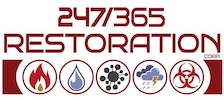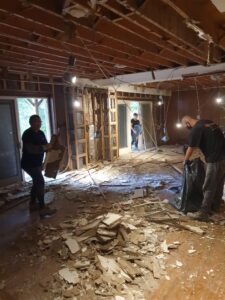

What Causes a Pipe to Burst in the First Place? | 24/7 Emergency Help Across Toronto & GTA
June 26, 2025
How Fast Should I Act After Flood Water Enters My Home?
July 14, 2025What’s the Difference Between Overland Flooding and Sewer Backup?
After a heavy downpour in Toronto, the last thing any homeowner wants to find is sewage water backing up into the basement. Unfortunately, it’s a common reality when stormwater overwhelms aging sewer systems across the GTA.
In this video, you’ll see how 247-365 Restoration quickly responds to a severe basement sewage backup caused by heavy rainfall. From toxic black water removal to full-scale sanitization, our trained professionals take immediate action to protect your home, your health, and your peace of mind. Read More.

Flooding in your home can happen in many ways, but two of the most common causes in Toronto and the GTA are overland flooding and sewer backup. While both lead to serious water damage, they originate from different sources and require different responses — not to mention different insurance coverage.
In this blog, the experts at 247-365 Restoration break down the differences between these two types of flooding, how to identify them, what causes them, and what steps to take to protect your property and respond fast.
💩 What Is Sewer Backup?
Sewer backup occurs when water from the municipal sewer system or private drain pipes reverses direction and enters your home through floor drains, toilets, bathtubs, or sinks — typically in the basement. This often happens during heavy rainfall, when Toronto’s aging sewer system becomes overwhelmed.
🔧 Common causes of sewer backup in the GTA:
Overloaded city sewer mains
Blocked or damaged private sewer lines
Tree roots intruding into underground pipes
Backwater valve failure
Flushing inappropriate items (e.g. grease, wipes)
Combined sewer systems during major storms
This type of water is known as black water, which is highly contaminated and contains dangerous bacteria, viruses, and pathogens. It poses a serious health risk and should only be cleaned by a certified professional.
⚠️ Signs of sewer backup:
Bad smells from basement drains
Gurgling sounds from toilets or sinks
Water backing up through shower drains or toilets
Visible sewage on your basement floor
Slow drains throughout the home
🌊 What Is Overland Flooding?
Overland flooding occurs when rainwater, melting snow, or rising river water flows over the surface of the ground and enters your home — typically through doors, windows, cracks in the foundation, or basement window wells.
This is the most common type of flooding during severe weather events, and it affects thousands of homes across Toronto, Mississauga, Brampton, Vaughan, and nearby areas every year.
🌧️ Typical causes of overland flooding:
Sudden, intense rainfall
Poor lot grading or drainage
Overflowing rivers or creeks
Blocked gutters and downspouts
Frozen or saturated soil during snowmelt
Construction that alters natural runoff
Though overland floodwater is usually cleaner than sewer water, it still poses risks of property damage, mold growth, and long-term structural issues.
🛑 Dealing with Water Damage in Your Home?
At 247-365 Restoration, we provide fast, certified, 24/7 emergency response for both sewer backup cleanup and overland flood restoration. Our team serves all of Toronto and the Greater Toronto Area, including Mississauga, Etobicoke, North York, Scarborough, and Vaughan.
📞 Call now: 647-697-8809
🌐 Visit us at 247-365.ca
✅ IICRC-Certified Technicians
✅ Residential & Commercial Service
✅ Direct Insurance Billing Available
🔍 Overland Flooding vs. Sewer Backup — At a Glance
Feature | Overland Flooding | Sewer Backup |
|---|---|---|
Source | Water from rain, rivers, or melting snow | Wastewater from sewer system |
Entry Point | Basement windows, foundation cracks, doorways | Floor drains, toilets, showers, sinks |
Water Quality | Often rainwater or melted snow | Contaminated black water |
Risk to Health | Moderate | High (biohazard) |
Insurance Coverage? | Requires overland flood endorsement | Requires sewer backup endorsement |
Cleanup Complexity | High | Very High (due to contamination) |
🛡️ What About Insurance?
Most standard home insurance policies in Ontario do not automatically cover either type of flooding. You’ll typically need to add overland flood coverage and sewer backup coverage as optional endorsements.
If you’re unsure, ask your insurance provider the following:
Does my policy cover overland water damage?
What is the maximum claim limit for water damage?
Are contents and structure both covered?
💡 Homeowners in flood-prone neighborhoods like East York, Downtown Toronto, or Mississauga River areas are especially encouraged to review their policies.
🧼 How 247-365 Handles Water Damage Restoration
We provide complete, professional restoration services for flooded basements, sewage overflows, and rain-related water damage:
24/7 Emergency Response
Water Extraction & Drying
Disinfection & Odor Removal
Mold Prevention & Air Purification
Material Removal & Structural Drying
Full Insurance Claim Support
We use advanced tools like thermal cameras, moisture meters, dehumidifiers, and HEPA air scrubbers to ensure your home is safe and restored properly.
💧 Trust 247-365 for Flood & Sewer Backup Restoration
Whether it’s caused by a storm or a sewer line issue, water damage can’t wait. The longer water sits in your home, the more extensive — and expensive — the damage becomes.
📞 Call 247-365 Restoration Now: 647-697-8809
🌐 https://247-365.ca
✅ Emergency Response in 45 Minutes
✅ Serving the Entire GTA
✅ Safe, Certified, and Reliable
Don’t risk your health or your investment. Let our flood restoration specialists in Toronto help you recover fast — anytime, day or night.
Share:
More Posts
FAQ Section | Answers to Common Concerns
Sewage backups are typically caused by blockages in the plumbing system, tree root invasions, overflows from municipal systems, or broken pipes
Professionals use industrial-grade pumps to remove contaminated water, clean and disinfect affected areas, and sanitize surfaces to prevent health hazards.
Sewage backup is highly dangerous. It contains harmful bacteria, viruses, and pathogens that can cause serious illnesses like gastrointestinal infections and respiratory issues.
Yes, if not addressed quickly, sewage can damage floors, walls, insulation, and electrical systems. Prolonged exposure may also lead to mould growth and structural decay.
No, avoid cleaning sewage yourself. The contamination risk is high. Leave the cleanup to professionals who have the proper equipment and protective gear.



